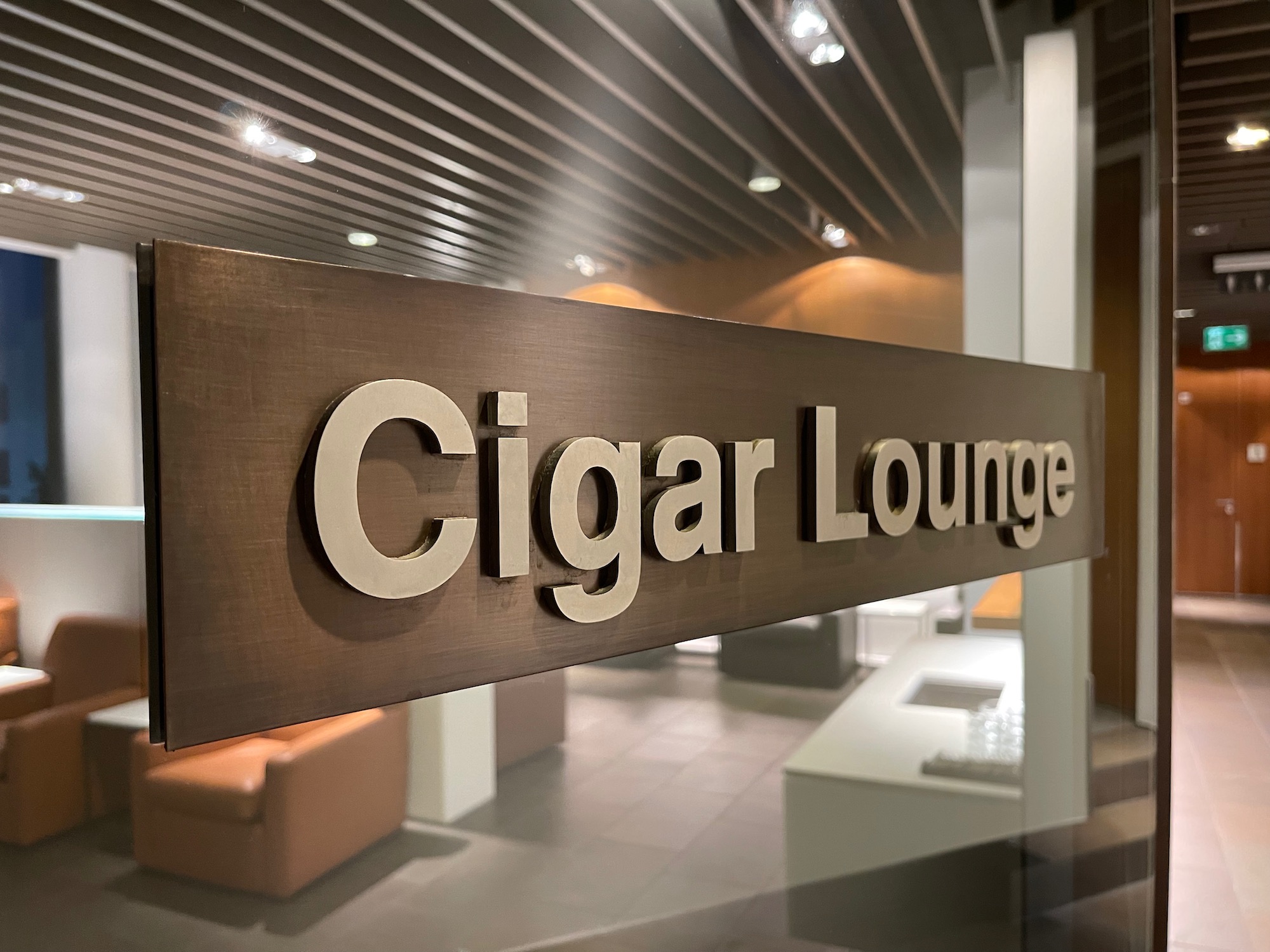
Many airports have banned smoking entirely, but now Detroit may go in the opposite direction with a new cigar lounge under consideration—and I think that’s a positive step.
Detroit Airport’s Planned Cigar Lounge: A Win for Travelers, Not a Health Threat
At Detroit Metropolitan Wayne County Airport, the airport authority has proposed creation of an airside cigar lounge and restaurant. Per View from the Wing, a coalition of health organizations including the American Heart Association, American Cancer Society Cancer Action Network, and the American Lung Association have blasted the idea as “a danger to millions of travelers and airport employees” who would be exposed to second-hand cigar smoke.
Here’s the thing: I don’t smoke. I’ve written previously that I mourn the loss of airport smoking lounges and that we need more airport smoking lounges, not fewer. I stand by that and I believe this proposal at DTW doesn’t set us two steps backward, but rather creates a thoughtful alternative which can be safely managed.
A Traveler-First Take on Smoke-Friendly Lounges
Why am I in favor of a cigar lounge inside a major U.S. airport? Because the current model is failing all parties. Smokers are forced to leave the secure area, go outside to the curb, then re-enter security. Nonsmokers pass by these areas anyway, inhale second-hand smoke near entrances or outdoor zones, creating even more annoyance and heath risk. As I’ve said for years, separately-ventilated indoor smoking rooms or secure-side terraces actually reduce the exposure of nonsmokers to second-hand smoke.
By providing a designated cigar lounge with advanced air-handling, strict access control, and proper ventilation, the airport can satisfy a cohort of travelers, many of whom expect smoking lounges when they travel internationally, and reduce unpleasant exposure for everyone else. The fact that smokers currently walk outside or crowd near terminal entrances means the smoke burden shifts and leaks into non-designated zones anyway.
The Health-Group Concerns and How They Fall Short
The opposition groups make valid points: cigars carry high levels of carcinogens, and indoor smoking rooms must meet stringent requirements to protect workers. They argue that one large cigar equals the tobacco content of a full pack of cigarettes. They worry airport employees will be exposed despite ventilation systems. But these concerns assume a worst-case scenario and ignore the middle ground.
The airport authority responded by saying that the bidding process for the lounge will require state-of-the-art ventilation and negative-pressure rooms to capture smoke before it escapes. That kind of infrastructure is not new: it exists at airports around the world (for example at Zürich Airport and Hong Kong International Airport). The question isn’t whether a cigar lounge can be built safely, it’s whether U.S. airports are willing to build it safely with transparent standards.
Balancing Perspective: Traveler Demand, Revenue, and Rights
From a traveler-centric view: yes, a smoking lounge caters to a minority of users, but travel is about accommodating many preferences under one roof. Some eateries serve vegan only, some resist allergens, some offer paid lounges. Smoking lounges are simply part of the mix. In my older article “Why I Mourn the Loss of Airport Smoking Lounges,” I observed that nearly 13% of U.S. adults still smoke and airports that eliminated secure-side options forced smokers into unintended places.
From a business view: airports are always balancing amenities, revenue, and experience. If a cigar lounge is operated by a third party, pays high rental and user fees, and is isolated with proper ventilation, it can bring additional revenue without compromising broader passenger comfort or health.
CONCLUSION
Yes, we must prioritize worker safety and public health at airports. But opposing any smoking area on principle ignores the reality that smokers continue to travel, smoke, and influence airport operations whether lounges exist or not. A properly designed cigar lounge at Detroit’s airport could deliver better separation of smoke, preserve non-smoker comfort, and tap into international expectations of airport amenities. I’m not naïve about the health implications, but I am realistic enough to recognize that the current status quo pushes smokers outdoors or even into restrooms, which doesn’t serve anyone well.
If Detroit proceeds, the real test will be implementation: transparent ventilation plans, crystal-clear access rules, strong worker protections, and separation from the general terminal. If done right, this could be a blueprint, not an anachronism, for how American airports manage smoking in the 21st century.
I’m all for this…
> Read More: Why I Mourn the Loss of Airport Smoking Lounges
> Read More: We Need More Airport Smoking Lounges, Not Fewer




Just allow weed smoking in the lounge as well, and all the objections will go away. At least from the anti cigar folks, but there may a new group that will oppose a pot lounge.
Smelly roo.full of smelly douchebags.
What an excellent nuanced perspective! Yes, this should be allowed. If Mayor Bloomberg had had his way, he would’ve been able to fully outlaw smoking in your own private home in New York City. That’s what these anti-smoking zealots want. They want to make it illegal everywhere, not just in places where in dangers others. It is facetious of them to argue that this is just about the health factor for non-smoker – especially given the technological improvements that you’ve highlighted.
Let’s be realistic – those smoking rooms don’t work. The ones at Zurich leak out into the terminal and you can smell the smoke while walking past, which is really unacceptable in a modern airport. Also, let’s not pretend providing smoking rooms will stop smokers from crowding outside the entrances (as they do outside virtually every airport I’ve been to that has a smoking room). They will be there anyway.
Smoking is not socially acceptable in the 21st century and it is not worth out going out of our way to accommodate them.
Well said. Agree 100% on all your points.
Stuff it James. You too Raul.
OK, so first, I detest tobacco smoke, and cigars are the worst. Second, I don’t pass smokers entering my homeport. Third, one can (and they have) designed areas where the smoke doesn’t leak. As a guy that really, really, really hates tobacco smoke, I voted against every smoking ban for private businesses. Why? I can vote with my wallet. Publicly owned spaces should be smoke free. My question for DTW is: how are you going to pay for this? If I don’t (i.e., you don’t use fees I pay to fly through there), then OK. So, how do they make butt suckers pay for this?
First be clear on what we are discussing here. Is this just another free space? Worldwide cigar lounges at resorts are lovely super ventiated spaces that not only sell high end cigars but also liquor pairings and beautiful nsmoking accessories. They don’t allow cigarette smoking. Expensive and not for the average credit card lounge lizards. ( and btw I can detect fried food odor on your clothes. ). So if we’re talking about a different type of venue rather than a smoker’s hot box , I cannot see the harm.
Ex smoker here and I HATE be exposed to cigarette or cigar smoke. I would much rather there be a designated area with proper ventilation than using the bathroom that is totally polluted with cigarette smoke as I encountered in terminal C at IAD yesterday. I couldn’t stand the way I smelled for the rest of the day until I could change and shower.
My old life of showering an stripping off clothing in the mudroom. It’s gross.
You’ve sold me, Matthew.